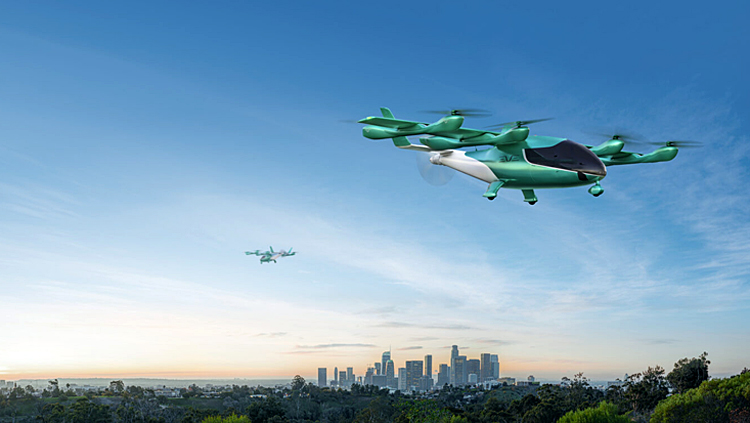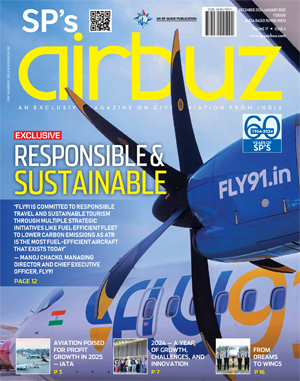Eve Air Mobility Twenty-Year Market Outlook Highlights Growth of Urban Air Mobility Globally
Outlook highlights a $280 billion passenger revenue and 30,000 aircraft opportunities driven by urban population growth, traffic concerns, and a commitment to sustainability

Eve Air Mobility, a global leader in electric vertical take-off and landing (eVTOL) aircraft, published its inaugural Global Market Outlook. The Outlook highlights the growth and demand surrounding the urban air mobility category for the next 20 years and provides insights into the societal, regional, and use case-specific factors driving demand.
The Global Market Outlook leverages data on 1,800 cities on the UN's World Urbanization Prospects database, 1,000 airports, and over 27,000 civil helicopters currently in operation.
"The Global Market Outlook furthers the excitement and momentum we have seen in collaborating with our customers and municipal partners worldwide," said Johann Bordais, CEO of Eve Air Mobility. "Today, the UAM market benefits from urban growth, higher traffic congestion, and a positive shift towards sustainable mobility. Demand for UAM is strong and marks the beginning of a major shift in how people will move and live in cities worldwide."
This report sets the stage for the 2025 Paris Air Show, where a major highlight will be the unveiling of Eve Air Mobility’s full-scale mockup, showcasing a design evolution that enhances the Eve-100 aircraft’s performance. The mockup, to be displayed in the Embraer pavilion outside Chalet #300, will showcase several key enhancements. These include a new cabin design, the addition of four-blade propellers, and wheeled landing gear. These improvements are designed to significantly enhance the safety, accessibility, comfort, performance, and maneuverability of the Eve-100, setting a new standard in Urban Air Mobility.
Transporting Three Billion Passengers by 2045
The topline numbers from The Global Market Outlook show an estimated in-service vehicle fleet of 30,000 eVTOLs by 2045. This fleet figure will be needed to support the estimated three billion passengers, creating a potential revenue of $280 billion.
Critical use cases driving growth include Urban Point-to-Point, Airport Shuttle, and Tourism, Medical Services, Corporate, Private and Charter. From a key driver perspective, the Outlook points to urban congestion as one of the critical factors demonstrating the need for alternative means of transportation as the 2022 United Nations World Population Prospects points to over two billion more people living in cities by 2050. Other data highlighting these congestion challenges include:
- By 2035, more than eight hundred cities will have a population of more than one million, accounting for over 2.5 billion people (World Cities Report, United Nations 2022).
- This growth will only accelerate the congestion challenges seen to date. In 2024, congestion continued to be a significant issue in major markets. For example, cities such as London (226 hours), New York (196 hours), Bengaluru (234 hours), Sao Paulo (222 hours), and Johannesburg (112 hours) saw significant annual time lost per person due to congestion.
Regional Breakdown
Eve anticipates significant Asia-Pacific growth driven by dense megacities and a rising middle class. North America shows promise due to substantial investment and an established aviation ecosystem. Europe may grow more slowly because of regulatory challenges. Latin America presents opportunities with eVTOLs addressing urbanization and renewable energy. While smaller, the Middle East is an early adopter focused on innovation and sustainable transportation. The Africa market is driven by the opportunity to overcome infrastructure challenges from high urban population growth and enhance tourism experience.
Key UAM Enablers and Challenges
While the future of urban air mobility is strong and shows great promise, the industry will have to overcome numerous challenges to realize its full potential.
Key challenges include:
- Safe operations: High safety is a non-negotiable requirement for high-scale operations.
- Regulatory approval: A comprehensive but accessible regulatory environment for a safe ecosystem is critical.
- Air traffic management (ATM): Airspace integration and future uncrewed operations are two areas where ATM will play a key role in high-density operations.
- Ecosystem: Existing heliport infrastructure is necessary to accommodate near-term operations.
- Battery technology: Higher battery densities are required for broader and longer-range applications.
The public acceptance of UAM will depend on a combination of these factors.
Click here to request a copy of the UAM Global Market Outlook.





